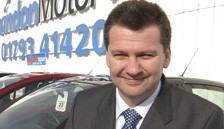Former Reg Vardy director Mark Lavery had a simple financial ambition when he set up Cambria Automobiles: establish a profitable £200 million turnover business over a five-year development plan.
He launched the company in July 2006 after buying Swindon Motor Park, turning over £8 million. Within two years, Cambria was turning over £270 million; this year, with a good wind, it will top £300 million with 24 franchises operating out of 18
locations.
What happened to the original business plan? “Opportunities came up – we took them,” says Lavery.
The Swindon business was losing a lot of money when Lavery took it on. His turn-around policy was based on four
pillars:
- Associate (Lavery-speak for staff) delight
- Guest (customer) delight
- Brand delight
- Stakeholder delight
“Our people aren’t our number one asset; they are our only asset,” adds Lavery. “What happens when a guest meets an associate determines the business performance.
“We have bought several sites that were losing millions of pounds the year before we acquired them; in the year post acquisition they are in profit because we put in new general managers. They make all the difference.”
That was the situation at Summit which had been propped up by Japanese business enterprise Sumitomo for years.
lthough the purchase swamped his existing business, Lavery had a clear plan to absorb and consolidate the 15-sites.
However, just a week after buying Summit, he received a call from the bank about Caledonia, which had just collapsed. Did he want to buy it, asked the bank.
“Normal people would’ve said no so soon after making such a large acquisition, but we knew the sites and we knew they had been successful in the past,” Lavery says. His answer to the bank was yes.
The group now extends from the south-west across to the south-east and up to the north-west.
“We will not go any further north and we will stay out of Wales
and East Anglia,” Lavery says.
“We are now at the point of building a bridge between the south-east and south-west and from the north-west to the south-east. That’s our acquisition strategy.”
Cambria is being approached by two or three dealers every week who are close to going into administration. Lavery adds: “We are in a very strong position to take advantage of opportunities and we expect to make announcements shortly on more acquisitions. The opportunities there will be to grow over the next 18 months we won’t see again in this lifetime.”
After years of working for major retailers like Reg Vardy and Hartwell, Lavery has been able to pick the best of their strategies and add his own ideas.
Key to Cambria’s approach to business is autonomy. Each general manager is a mini-managing director of their dealership. They have their own bank account and own stocking plans; they make all the decisions and they pay for everything out of their own account which gives complete ownership.
For Lavery the business is not about developing a national brand; it’s about general managers who understand that as employers in their local community, they have an important role to play. And it’s about enthusing associates to be proud of their dealership.
“The ultimate measure of associate delight is when they go into their local pub on a Saturday night and they are proud to tell everyone that they work for Invicta or Grange, etc,” says Lavery.
Website drives growth
Cambria’s new website has added video as well as slideshows on selected cars. Most models also have nine pictures. It has made an impact. Between Christmas and New Year last year, more than 2,000 requests were logged.
Lavery is trialling Blackberrys with his general managers and sales manager to keep them close to the internet. During last year’s Champions League final cars were sold via Blackberry.
“The web is our primary growth tool; it’s bringing the industry into a retail environment because it’s pure – there’s no hiding,” Lavery says.
“We can transact – and we have transacted – online where a guest hasn’t visited the showroom before buying a cars. At Swindon, around 2% of sales are transacted online.”
He adds: “The franchised dealer model is here and it isn’t changing. But the web is a growth opportunity.”













Login to comment
Comments
No comments have been made yet.